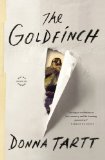Summary | Excerpt | Reviews | Beyond the Book | Readalikes | Genres & Themes | Author Bio

A Novel
by Donna TarttChapter 1.
Boy with a Skull
i.
WHILE I WAS STILL in Amsterdam, I dreamed about my mother for the first time in years. I'd been shut up in my hotel for more than a week, afraid to telephone anybody or go out; and my heart scrambled and floundered at even the most innocent noises: elevator bell, rattle of the minibar cart, even church clocks tolling the hour, de Westertoren, Krijtberg, a dark edge to the clangor, an inwrought fairy-tale sense of doom. By day I sat on the foot of the bed straining to puzzle out the Dutch-language news on television (which was hopeless, since I knew not a word of Dutch) and when I gave up, I sat by the window staring out at the canal with my camel's-hair coat thrown over my clothes—for I'd left New York in a hurry and the things I'd brought weren't warm enough, even indoors.
Outside, all was activity and cheer. It was Christmas, lights twinkling on the canal bridges at night; red-cheeked dames en heren, scarves flying in the icy wind, clattered down the cobblestones with Christmas trees lashed to the backs of their bicycles. In the afternoons, an amateur band played Christmas carols that hung tinny and fragile in the winter air.
Chaotic room-service trays; too many cigarettes; lukewarm vodka from duty free. During those restless, shut-up days, I got to know every inch of the room as a prisoner comes to know his cell. It was my first time in Amsterdam; I'd seen almost nothing of the city and yet the room itself, in its bleak, drafty, sunscrubbed beauty, gave a keen sense of Northern Europe, a model of the Netherlands in miniature: whitewash and Protestant probity, co-mingled with deep-dyed luxury brought in merchant ships from the East. I spent an unreasonable amount of time scrutinizing a tiny pair of gilt-framed oils hanging over the bureau, one of peasants skating on an ice-pond by a church, the other a sailboat flouncing on a choppy winter sea: decorative copies, nothing special, though I studied them as if they held, encrypted, some key to the secret heart of the old Flemish masters. Outside, sleet tapped at the windowpanes and drizzled over the canal; and though the brocades were rich and the carpet was soft, still the winter light carried a chilly tone of 1943, privation and austerities, weak tea without sugar and hungry to bed.
Early every morning while it was still black out, before the extra clerks came on duty and the lobby started filling up, I walked downstairs for the newspapers. The hotel staff moved with hushed voices and quiet footsteps, eyes gliding across me coolly as if they didn't quite see me, the American man in 27 who never came down during the day; and I tried to reassure myself that the night manager (dark suit, crew cut, horn-rimmed glasses) would probably go to some lengths to avert trouble or avoid a fuss.
The Herald Tribune had no news of my predicament but the story was all over the Dutch papers, dense blocks of foreign print which hung, tantalizingly, just beyond the reach of my comprehension. Onopgeloste moord. Onbekende. I went upstairs and got back into bed (fully clad, because the room was so cold) and spread the papers out on the coverlet: photographs of police cars, crime scene tape, even the captions were impossible to decipher, and although they didn't appear to have my name, there was no way to know if they had a description of me or if they were withholding information from the public.
The room. The radiator. Een Amerikaan met een strafblad. Olive green water of the canal.
Because I was cold and ill, and much of the time at a loss what to do (I'd neglected to bring a book, as well as warm clothes), I stayed in bed most of the day. Night seemed to fall in the middle of the afternoon. Often—amidst the crackle of strewn newspapers—I drifted in and out of sleep, and my dreams for the most part were muddied with the same indeterminate anxiety that bled through into my waking hours: court cases, luggage burst open on the tarmac with my clothes scattered everywhere and endless airport corridors where I ran for planes I knew I'd never make.
Excerpted from The Goldfinch by Donna Tartt. Copyright © 2013 by Donna Tartt. Excerpted by permission of Little Brown & Company. All rights reserved. No part of this excerpt may be reproduced or reprinted without permission in writing from the publisher.
Asking a working writer what he thinks about critics...
Click Here to find out who said this, as well as discovering other famous literary quotes!
Your guide toexceptional books
BookBrowse seeks out and recommends the best in contemporary fiction and nonfiction—books that not only engage and entertain but also deepen our understanding of ourselves and the world around us.